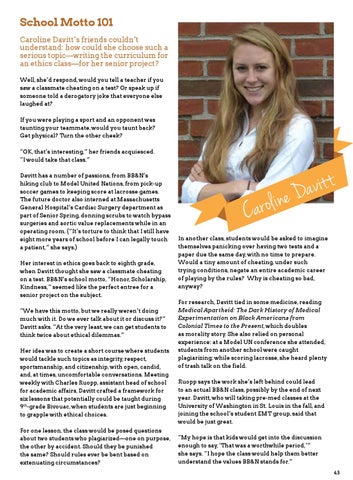School Motto 101 Caroline Davitt’s friends couldn’t understand: how could she choose such a serious topic—writing the curriculum for an ethics class—for her senior project? Well, she’d respond, would you tell a teacher if you saw a classmate cheating on a test? Or speak up if someone told a derogatory joke that everyone else laughed at? If you were playing a sport and an opponent was taunting your teammate, would you taunt back? Get physical? Turn the other cheek? “OK, that’s interesting,” her friends acquiesced. “I would take that class.” Davitt has a number of passions, from BB&N’s hiking club to Model United Nations, from pick-up soccer games to keeping score at lacrosse games. The future doctor also interned at Massachusetts General Hospital’s Cardiac Surgery department as part of Senior Spring, donning scrubs to watch bypass surgeries and aortic value replacements while in an operating room. (“It’s torture to think that I still have eight more years of school before I can legally touch a patient,” she says.) Her interest in ethics goes back to eighth grade, when Davitt thought she saw a classmate cheating on a test. BB&N’s school motto, “Honor, Scholarship, Kindness,” seemed like the perfect entree for a senior project on the subject. “We have this motto, but we really weren’t doing much with it. Do we ever talk about it or discuss it?” Davitt asks. “At the very least, we can get students to think twice about ethical dilemmas.” Her idea was to create a short course where students would tackle such topics as integrity, respect, sportsmanship, and citizenship, with open, candid, and, at times, uncomfortable conversations. Meeting weekly with Charles Ruopp, assistant head of school for academic affairs, Davitt crafted a framework for six lessons that potentially could be taught during 9th-grade Bivouac, when students are just beginning to grapple with ethical choices. For one lesson, the class would be posed questions about two students who plagiarized—one on purpose, the other by accident. Should they be punished the same? Should rules ever be bent based on extenuating circumstances?
C ar
t t i v a lo ine D
In another class, students would be asked to imagine themselves panicking over having two tests and a paper due the same day, with no time to prepare. Would a tiny amount of cheating, under such trying conditions, negate an entire academic career of playing by the rules? Why is cheating so bad, anyway? For research, Davitt tied in some medicine, reading Medical Apartheid: The Dark History of Medical Experimentation on Black Americans from Colonial Times to the Present, which doubles as morality story. She also relied on personal experience: at a Model UN conference she attended, students from another school were caught plagiarizing; while scoring lacrosse, she heard plenty of trash talk on the field. Ruopp says the work she’s left behind could lead to an actual BB&N class, possibly by the end of next year. Davitt, who will taking pre-med classes at the University of Washington in St. Louis in the fall, and joining the school’s student EMT group, said that would be just great. “My hope is that kids would get into the discussion enough to say, ‘That was a worthwhile period,’” she says. “I hope the class would help them better understand the values BB&N stands for.” 43 37
